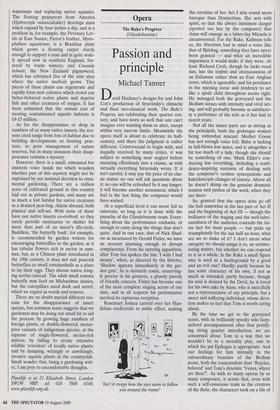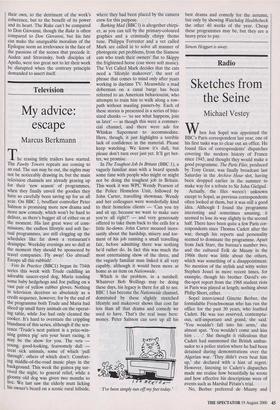Opera
Passion and principle
Michael Tanner
David Hockney's designs for and John Cox's production of Stravinsky's climactic and final neo-classical work, The Rake's Progress, are celebrating their quarter cen- tury, and have worn so well that one can't imagine ever wanting them to alter, except within very narrow limits. Meanwhile the opera itself is about to celebrate its half- century, and there the judgment is rather different. Controversial to begin with, and stupidly received by many critics, it was subject to something near neglect before mutating effortlessly into a classic, as with virtually everything Stravinsky wrote. If it isn't careful, it may pay the price of its clas- sic status: no one will ask questions about it; no one will be refreshed by it any longer; it will become another monument, which I feel is the last thing the composer would have wished.
At a superficial level it can never fail to entertain, so long as it is done with the panache of the Glyndebourne team. Every- thing about the performance enchants, or enough to carry along the things that don't quite. And in one case, that of Nick Shad- ow as incarnated by Gerald Finley, we have an account alarming enough to disrupt complacency. From his opening apparition, after Tom has spoken the line 'I wish I had money', when, as directed by the libretto, `Shadow appears immediately at the gar- den gate', he is sinisterly comic, unnerving- ly precise in his gestures, a ghastly parody of friendly concern. Finley has become one of the most complete singing actors of our time, and in all respects his performance merited its rapturous reception.
Rosemary Joshua carried over her Han- delian credentials to noble effect, making Isn't it creepy how the eyes seem to follow you around the room!' the cavatina of her Act I aria sound more baroque than Donizettian. She acts with spirit, so that the always imminent danger (spotted too late by the composer) that Anne will emerge as a latter-day Micaela is circumvented. For the Rake, Kallman tells us, the librettists had in mind a voice like that of Bjorling, something they have never been granted — and what an incredible impression it would make if they were. At least Richard Croft, though he lacks vocal size, has the timbre and strenuousness of an Italianate rather than an East Anglian tenor, which is agreeable; and his petulance in the opening scene and tendency to act like a spoilt child throughout seems right. He managed both the graveyard and the Bedlam scenes with intensity and vivid act- ing, and will probably become as satisfacto- ry a performer of the role as it has had in recent years.
Not all the minor parts are as strong as the principals, both the grotesque women being somewhat miscast: Mother Goose has not enough voice left; Baba is lacking in full-blown low notes, and is altogether a bit too much of a lady, though she should be something of one. Mark Elder's con- ducting has everything, including a confi- dence-inspiring sureness of dealing with the composer's restless syncopations and kaleidoscopic changes of texture. Above all he doesn't skimp on the genuine dramatic tension and pathos of the work, when they are there.
So, granted that the opera does go off the boil somewhat in the last part of Act II and the beginning of Act III — though the brilliance of the staging and the well-lubri- catedness of the audience conceals the lat- ter fact for most people — but picks up triumphantly for the last half an hour, what are we to make of it? I don't mean what category we should assign it to, an uninter- esting matter, but whether we can respond to it as a whole. Is the Rake a small figure who is used as a battleground by a good and an evil one? Hardly: partly because he has some character of his own, if not as much as intended; partly because, though his soul is desired by the Devil, he is loved for his own sake by Anne, who is mercifully not a representative of any principle, but a sweet and suffering individual, whose devo- tion makes us feel that Tom is worth caring about.
By the time we get to the graveyard scene, with its brilliantly spooky solo harp- sichord accompaniment after that petrify- ing string quartet introduction, we are concerned about Tom in a way that we wouldn't be in a morality play, one to which the pat Epilogue is appropriate. And our feelings for him intensify in the extraordinary beauties of the Bedlam scene, both the transcendent duet 'Rejoice, beloved' and Tom's desolate 'Venus, where art thou?'. As with so many operas by so many composers, it seems that, even with such a self-conscious team as the creators of the Rake, the characters took on a life of their own, to the detriment of the work's coherence, but to the benefit of its power and its heart. The Rake can't be compared to Don Giovanni, though the Rake is often compared to Don Giovanni, but his fate can make the unarguable moralism of the Epilogue seem an irrelevance in the face of the passions of the scenes that precede it. Auden and Stravinsky, both disciples of Apollo, were too great not to let their work be disrupted when the contrary principle demanded to assert itself.



























































 Previous page
Previous page